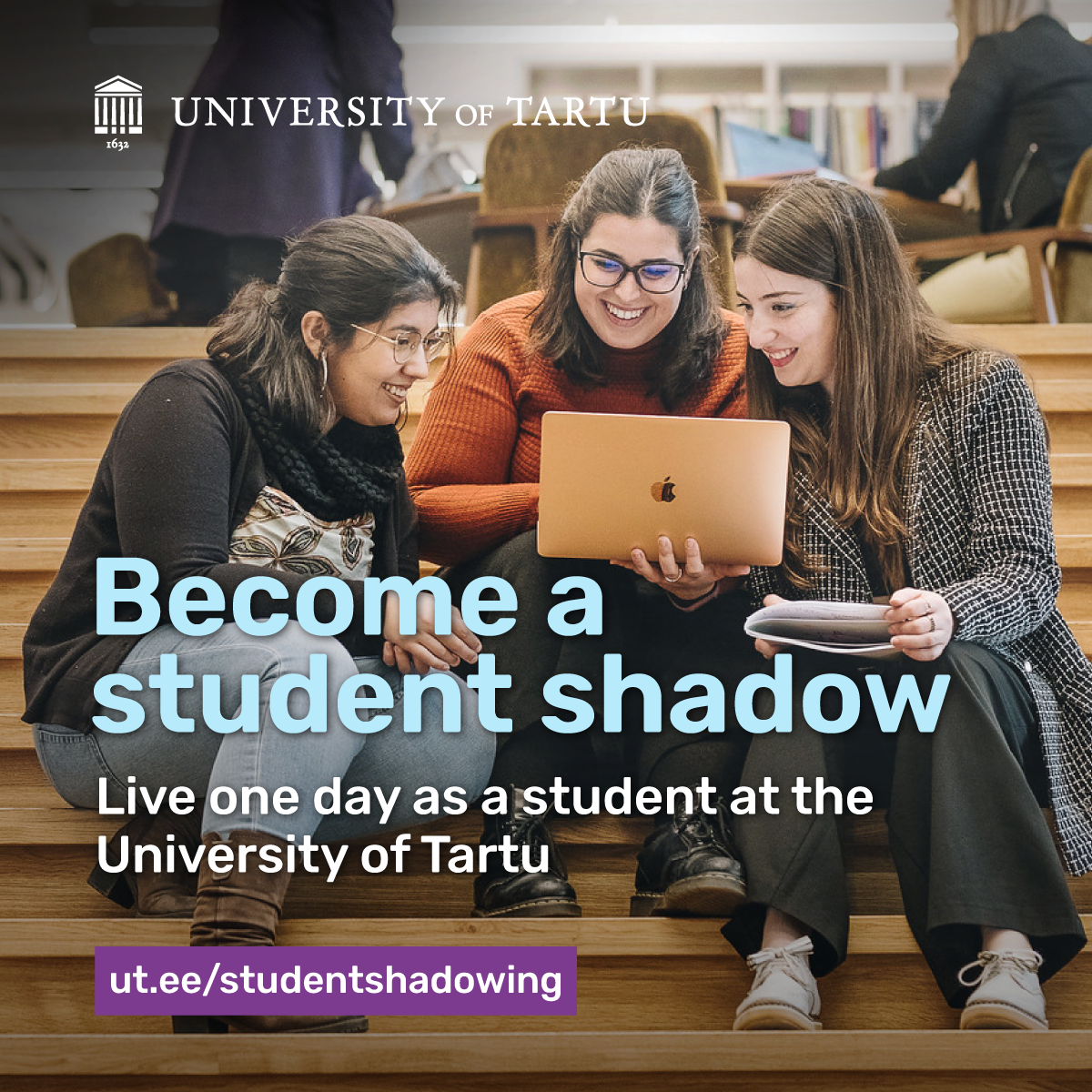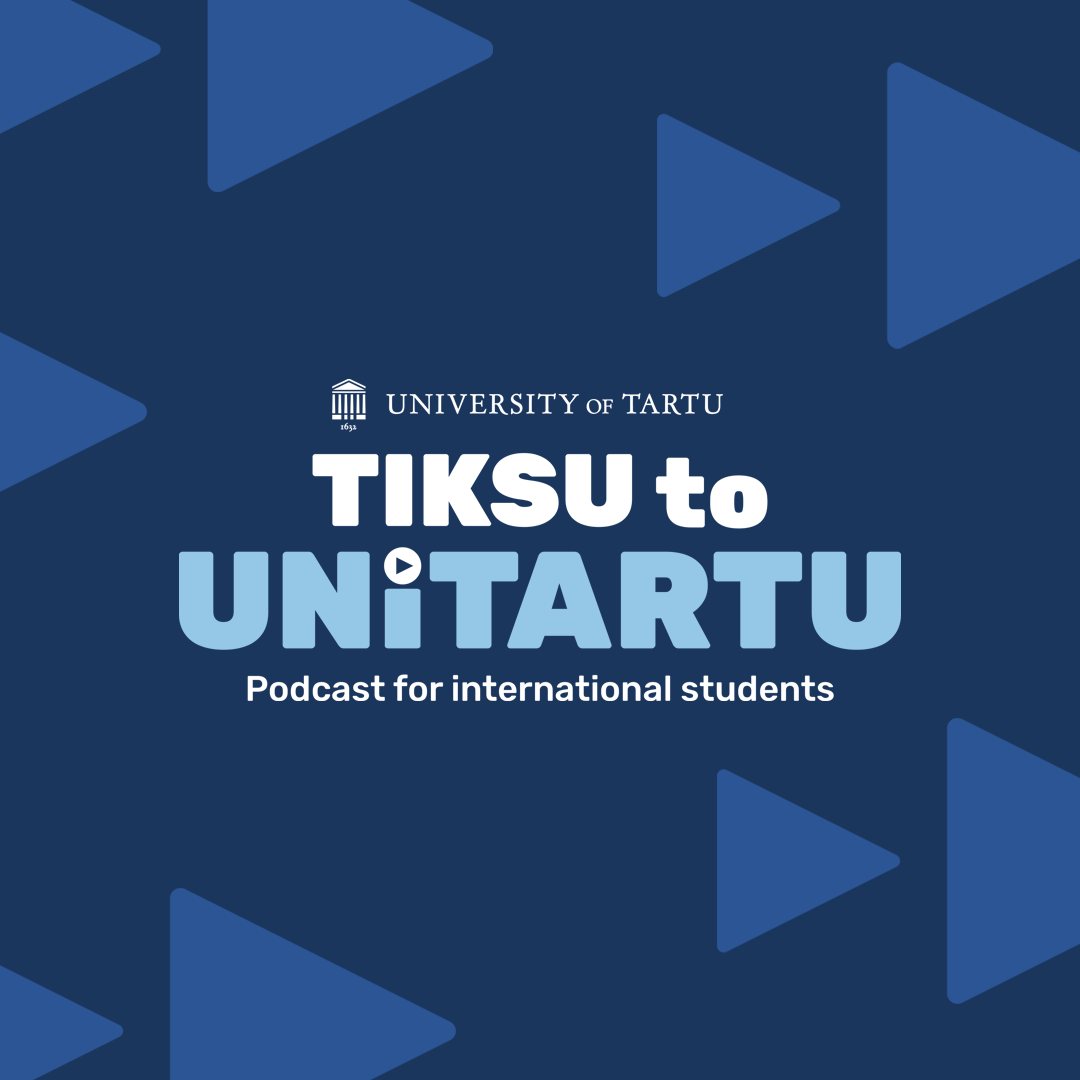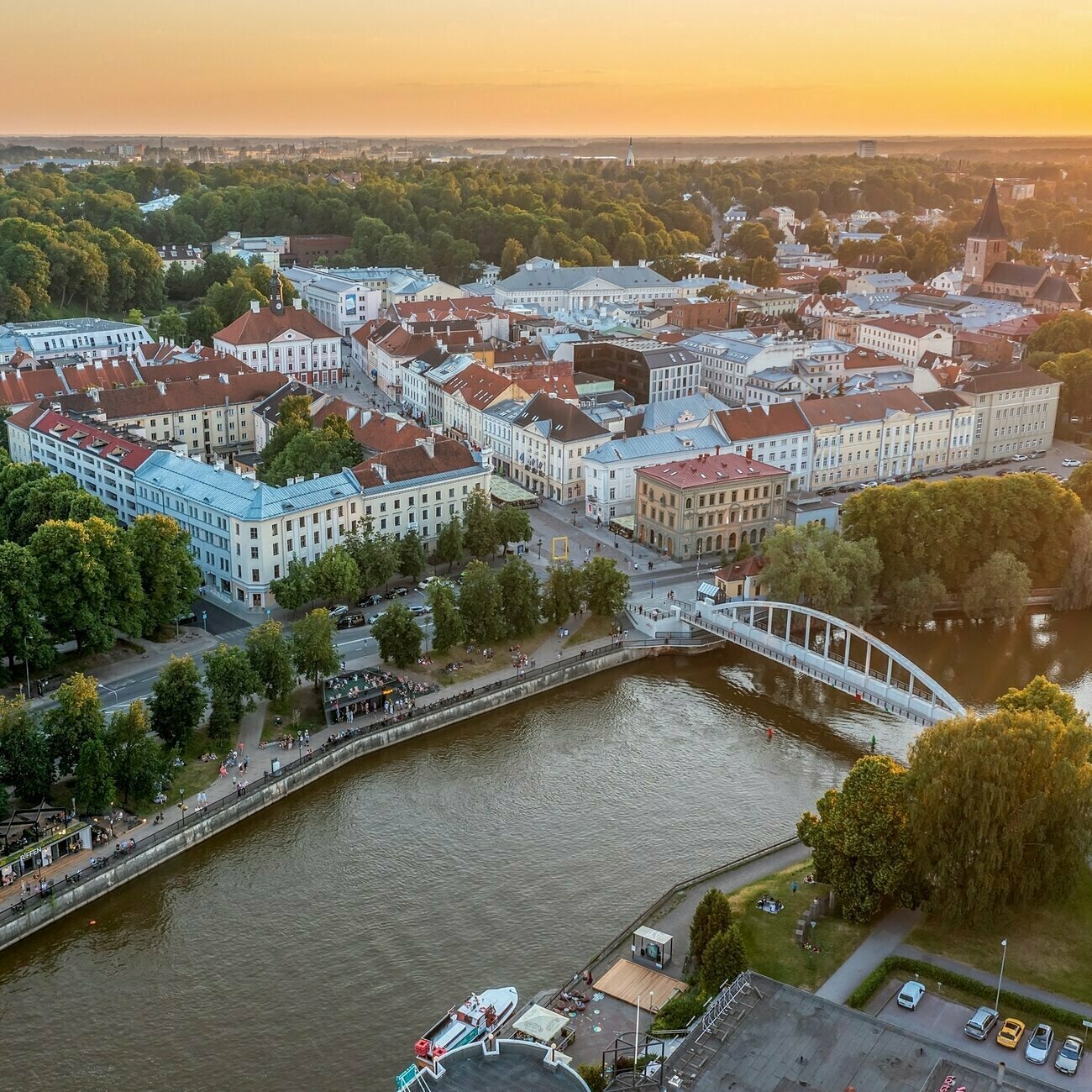Estonian and Finno-Ugric Languages
Master's
2 January
15 March
30 April
1 September
- The University of Tartu is ranked among the top 200 globally in linguistics (see Rankings and Surveys).
- Tartu is the best place in the world to learn Estonian.
- The programme provides excellent opportunities for studying other Finno-Ugric languages like Finnish, Hungarian, Komi, etc., under the guidance of native speakers.
- The programme emphasises the development of digital and analytical skills, offering computational linguistics and digital humanities courses.
- After graduation, you can work in language teaching, translation, diplomacy, enterprise, and international cooperation in multilingual environments or continue your academic career at the doctoral level.
The 2-year master's programme in Estonian and Finno-Ugric Languages (EFUL) is unique in combining in-depth language learning with comprehensive, English-based studies in linguistics. We offer specialisations in either Estonian or Finno-Ugric Languages. Whichever you choose, you will have access to shared modules on theoretical and methodological aspects of synchronic and diachronic linguistics, with an emphasis on active language learning, combining theory and practice.
The programme also emphasises the development of digital skills. You will get an overview of the Estonian and Finno-Ugric language corpora, databases and language technology resources necessary for carrying out fieldwork and linguistic research. In collaboration with the University of Tartu's Centre for Digital Humanities and Information Society, you can take computational linguistics and programming courses. Read more about the centre here.
Why study Estonian and Finno-Ugric languages at the University of Tartu?
- World-class linguistics: The University of Tartu is ranked among the top 200 globally in the field of linguistics (see Rankings and Surveys)
- Academic excellence: The University of Tartu belongs to the top 350 universities in the world (see Rankings and Surveys).
- One of a kind: This is the only Estonian and Finno-Ugric master’s programme taught in English in the world.
- Be in the right place: Tartu is the best place in the world to learn Estonian as the University of Tartu is the most reputable place for teaching and learning Estonian. In Tartu, you can practice your language skills with native speakers wherever you go.
- Great opportunities for studying other Finno-Ugric languages: The University of Tartu has long attracted students and scholars from other Finno-Ugric-speaking areas. Experienced native speakers teach languages like Finnish, Hungarian and Komi. You will find active Finno-Ugric language communities and organisations, like Fenno-Ugria, which hosts the Finno-Ugrian Days festival (read more here).
- International collaboration in research and teaching: Estonian and Finno-Ugric linguists are involved in global collaboration networks that provide access to leading research in the field and various opportunities for supplementary courses (see the networks here). Students can take advantage of our many Erasmus partnerships for studying abroad. In 2025, it will be our privilege to host the biggest international Finno-Ugric conference Congressus Internationalis Fenno-Ugristarum (read more about the event here).
I chose to continue my studies at the University of Tartu as it is a great place to study this specific programme. We have great professors here that have a lot to offer. It's also a small programme, so you really can get a lot of extra help from the professors if needed.
Scholarships
In addition to tuition-waiver student places, a number of scholarships and living expense stipends are available for EFUL students. Merit-based scholarships are available from the Kadri, Nikolai and Gerda Rõuk Memorial Fund (read more about the fund here in Estonian) as well as from the Kindred Peoples’ Programme (the latter specifically for students on the Finno-Ugric Languages specialisation, read more about the programme here). They are intended to cover tuition costs (€4,000/year) and subsidise living costs (€200/month for 10 months). Applicants will receive more information about scholarships after being accepted to the programme.
Programme highlights in media
- Watch here the programme director talk about the master's programme in Estonian and Finno-Ugric Languages during Virtual Open Day 2024.
In addition to learning the foundation in linguistics, you can choose between two specialisations:
- Estonian – includes in-depth studies in Estonian language and linguistics. Students begin studies at the appropriate language level according to their proficiency in Estonian. You will get additional support for learning Estonian from our Language Advisor for Non-Estonian Students. This module also gives an overview of the Estonian language as well as Estonian history and culture.
- Finno-Ugric Languages – gives an overview of the history and a comparison of Finno-Ugric languages and cultures. Students have the opportunity to study three or more Finno-Ugric languages. There are courses in Finnish, Hungarian, Komi, Livonian, Erzya, Saami varieties, Kamas, and others.
Curriculum version:
More info: Study Information System
Institute of Estonian and General Linguistics
The Institute of Estonian and General Linguistics conducts research and teaching in language and linguistics. Its primary mission is the study and teaching of Estonian, with other Finno-Ugric languages also playing a significant role in its core activities. This focus establishes the Institute as one of the leading Finno-Ugric research centres in the world. Additionally, it offers instruction in general linguistics, enhancing the skillset of its graduates through subjects in computational linguistics and digital humanities. The Institute comprises four departments, two laboratories, and three centres.
The institute's latest news and articles are available on its website here in both Estonian and English.
Teaching staff of the Estonian and Finno-Ugric Languages programme
A highlight of the programme is language teaching by native speakers and language experts, including official languages of the European Union (Estonian, Finnish, Hungarian) and languages spoken by smaller Finno-Ugric communities.
The academic staff on the programme bring diverse research profiles and come from various language backgrounds, revealing the multiplicity of linguistics and linguistic experience.
| Staff | Course(s) | CV on Estonian Research Information System |
| Prof. Gerson Klumpp | Finno-Ugric Studies | Go to Estonian Research Information System |
| Prof. Liina Lindström | Modern Estonian | Go to Estonian Research Information System |
| Prof. Birute Klaas-Lang | Estonian as a Foreign Language | Go to Estonian Research Information System |
| Prof. Virve Vihman | Psycholinguistics | Go to Estonian Research Information System |
| Joshua Wilbur | Digital Humanities, Documentary Linguistics, Saami | Go to Estonian Research Information System |
| Eva-Liina Asu-Garcia | Phonetics | Go to Estonian Research Information System |
| Pärtel Lippus | Phonetics | Go to Estonian Research Information System |
| Nikolay Kuznetsov | Komi language, Finno-Ugric Studies | Go to Estonian Research Information System |
| Elena Markus | Finnic languages | Go to Estonian Research Information System |
| Miina Norvik | Finnic languages | Go to Estonian Research Information System |
Guest lectures, conferences and seminars
The institute’s event calendar is diverse and active, with a continual stream of seminars, conferences, and guest lectures that bring top international scholars to our institute and attract students throughout the semester.
The Institute of Estonian and General Linguistics has been leading the international MEDAL consortium (funded by the European Union and UKRI, read more here) since 2023. During the 3-year project, numerous summer schools and workshops are organised with a focus on methodological excellence in linguistics and developing career skills.
The TÜling lecture series offers scholarly talks on a wide range of linguistic topics every week for the whole institute. Read more about the series here.

Explore Tartu, the Institute of Estonian and General Linguistics, and the student dormitories through the university's virtual tour here.
Graduates of this programme will be highly qualified for positions requiring language skills in Estonian and other Finno-Ugric languages, both in Estonia and abroad. This includes jobs in language teaching, translation, diplomacy, enterprise, and international cooperation in multilingual environments. Students completing the programme will learn analytic and digital skills and practise communication and teamwork. Graduates are also well-suited for employment in cultural heritage institutions and museums.
The programme affords opportunities to learn big data processing and data analysis, which are transferrable skills for many jobs outside of traditional linguistics. Graduates will be qualified for jobs that require multiple language skills or expertise in processing language data, depending on their coursework choices.
The master’s programme gives a solid foundation for continuing studies at the doctoral level. Our courses enable students to get an idea of serious linguistics research, helping them decide whether to opt for a research career.
Admission requirements for Estonian and Finno-Ugric Languages
- bachelor’s degree or equivalent qualification (must be obtained by the end of July) – please see our country-specific document requirements
- English language proficiency – please see our acceptable tests and exempt categories
NB! The restrictions for the citizens of the Russian Federation are specified here.
Applications are evaluated based on
- the score of the motivation letter (yields 50% of the final score)
- the score of the admission interview (yields 50% of the final score)
Each candidate should write a motivation letter (in English, 2000-2500 characters including spaces) describing:
· Why the candidate wants to study in the EFUL program;
· The candidate's background relating to Estonian and/or Finno-Ugric languages;
· The candidate's general interest in linguistics;
· Which specialty (Estonian or Finno-Ugric languages) the candidate would choose and why.
The following aspects will be considered in assessing the motivation letter:
· Reasons for entering the programme and previous knowledge about linguistics and Finno-Ugric languages; 60%
· The candidate's analytical skills, language skills and ability to structure ideas. 40%
Admission interviews take place between 7-17 April 2025. The exact interview date and time for each qualifying applicant will be specified in early April when the motivation letters have been evaluated.
Based on the assessment of the motivation letter, a candidate may then be selected for an online admission interview (15 minutes). The admission interview will be in English. The questions will be partly based on the motivation letter and are intended to find out more about:
· The candidate's motivation for studying Estonian and/or other Finno-Ugric languages (40 points);
· The candidate's general orientation concerning linguistics (40 points);
· The candidate's ability to express themselves effectively in English (20 points).
For each assignment, the maximum score is 100 points and minimum score 51 points to be considered for admission. The applicant needs to receive at least 51 points for the motivation letter, in order to qualify for the admission interview. After the interview, the final admission score is calculated. The total admission score will be the weighted sum of the score of the motivation letter and the interview. The maximum number of final points is 100. Only applications which receive 66 points and above as a combined score from both indicators will qualify for admission.
Further information on assessing candidates´ academic performance and calculating admissions´ score.
How to apply
The following information applies to international students and Estonian students who graduated abroad:
The application system opens on 2 January and closes on 15 March. The following documents must be submitted electronically via DreamApply by 15 March:
- online application
- motivation letter
- official certified copy of the bachelor's diploma or its equivalent and Diploma Supplement (transcript) in the original language (must include a description of the grading scale).
NB! Applicants graduating in the upcoming spring/summer and having their diploma and final transcript issued later than the application deadline should electronically submit their most recent official transcript by the application deadline. The transcript should be supplemented by an official statement from the issuing institution indicating current enrollment and expected graduation date. Admitted candidates are required to post certified copies of their graduation documents as soon as these have been issued (must reach us no later than by the end of July). - official translation of the bachelor’s diploma and Diploma Supplement (transcript) into English, translation certified
- proof of English language proficiency
- copy of the passport page stating the applicant’s personal particulars
- confirmation/receipt of application fee payment (if applicable). All international applicants are required to pay the application fee EUR 100, unless they have completed the previous study level in Estonia. An application will only be processed after the fee has been received by the UT.
Submitted applications can not be edited. It is only possible to upload new documents (e.g. graduation certificates). Applicants will receive feedback and notifications through the DreamApply system to their e-mail. Incomplete applications or those submitted by e-mail will not be considered for admission.
Guide to submitting an electronic application on DreamApply.
NB: The University of Tartu has no official partnerships with agents or educational representatives. We strongly recommend applying directly to the university without the help of unauthorised third-party entities. Should you use such a service, please ensure that your application's contact information is your personal details (your e-mail, phone number, etc.).
The evaluation of applications will be made based on the electronic copies added to DreamApply. A general ranking list will be formed based on the electronically submitted applications and admission results (including offers) will be announced to all applicants personally via DreamApply by April 30 at the latest. Admitted candidates are expected to accept or decline the offer in DreamApply in 7 days. If the decision is not communicated to UT via DreamApply by the stipulated deadline, UT reserves the right to withdraw the admission offer.
NB! It is not possible to postpone the beginning of studies to the next academic year.
Terms and conditions of the admission offer
Admission offers are conditional. This means that there are conditions in the offer which the applicant needs to fulfil in order to be admitted (e.g. sending application documents by post; obtaining the required level of education). If the conditions are not met, UT has the right to withdraw the offer. Also, UT reserves the right to withdraw or amend any offer or revoke the matriculation of a student, if it becomes evident that the application contains fraudulent information, the qualification does not provide access to the chosen study programme or the student is found to have omitted key information from the application. Should such circumstances occur, UT will not be liable for any material or immaterial loss which the student may suffer as a result.
Once the admission results have been announced, all admitted students are required to send the application documents by post to: Student Admissions, University of Tartu, Ülikooli 18-133, Tartu 50090, ESTONIA.
The documents are expected to be mailed only by those receiving the admission offer (unless instructed otherwise by the admissions staff). The documents must reach the university within 3 weeks from the announcement of the offer. If the application documents do not reach us by the deadline, the university has the right to withdraw the admission offer. Applicants will be informed when their documents have arrived.
Requirements for educational documents
All copies of educational documents (diplomas and Diploma Supplements/transcripts) must be officially certified. By certified we mean that the copies should bear an original signature and seal of the authority certifying that these are true copies of the original document(s). The copies can be certified either 1) by an authorised official of the issuing institution, or 2) by a notary, or 3) with an Apostille attached. NB! Country-specific requirements may also specify the way documents from certain countries must be certified.
Please note that UT does not accept simple copies made on the basis of already certified copies (primary copies are needed).
All admitted students are required to present their original qualification certificates upon arrival (unless these were sent directly from the issuing institution).
Paying the tuition fee (applicable to those receiving a fee-based study place offer)
- EU/EEA/Swiss citizens are required to pay the fee for the first semester once they arrive in Tartu (by 20 September at the latest after signing the fee contract, please read more here).
- Admitted students from other countries are required to pre-pay half of the first semester's tuition fee. The invoice along with the pre-payment deadline and payment details will be sent to applicants via DreamApply after they have accepted the admissions offer and the University has received the hard copies of the application documents. Second part of the fee is due on 20 September. NB! The official admission letter (necessary for visa application) will only be issued once the University of Tartu has received the pre-payment.
- NB! Once you have been offered a fee-based study place, be aware that it will not be changed into a fee waiver study place. By transferring the pre-payment to the university, you confirm that you have informed yourself about the process of the visa and temporary residence permit application and you are able to arrive in Estonia by the start of the academic year. If you have any questions please contact studentvisasupport@ut.ee.
The official admission letter will be sent to admitted students electronically via DreamApply only after the admissions office has received and reviewed hard copies of the application documents, and received the tuition fee pre-payment (if a pre-payment was required, please see step 3 for more details).
NB! The electronic admission letter is also sufficient for non-EU students for applying for visa/residence permit at an Estonian embassy.
Once the admission letter is issued, accepted students may proceed further with arranging their arrival. All non-EU students should first consult information on the process of visa and temporary residence permit application to be sure, as where and when the relevant documents need to be applied. Note that housing at the UT dormitories can be applied during a limited period of time, unless specified otherwise on the website.
NB! Admitted students who are not citizens of an EU or EEA country or Switzerland need to make sure they obtain the Estonian long-term visa on time in order to be able to participate in the orientation programme for international students held in the last week of August. They are also required to visit the Admissions Office in person to complete their arrival registration by September 1, 2025, at the latest. Failure to do so will result in the revocation of their admission decision and visa.
For housing alternatives please find further information on Tartu Welcome Centre website. Travel information can be found here. Based upon common queries, the most important information has been summarised into a pre-arrival information website UT Getting Started.
Estonian applicants should apply via National Admission Information Systems (SAIS). Further information in Estonian.
Contacts
Ask about the admission requirements and application process
Find out what awaits you at UniTartu

Join info events
Learn more about the university and its study programmes by attending our info events for future students. Our staff also attends international fairs and info sessions.

Spend a day as a student
During the academic year, you can spend a day with a current student in your field of interest, giving you a firsthand look at student life and the University of Tartu.

Listen to the podcast
The "Tiksu to UniTartu - Podcast for International Students" covers topics such as housing, student organisations, healthcare, etc.

Visit the campus
Visiting the campus gives you a great understanding of what it would be like to study here. You can visit us throughout the year.

07.02.2025






